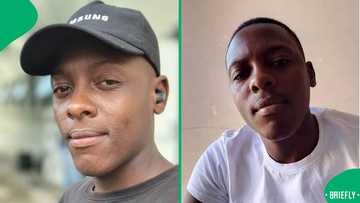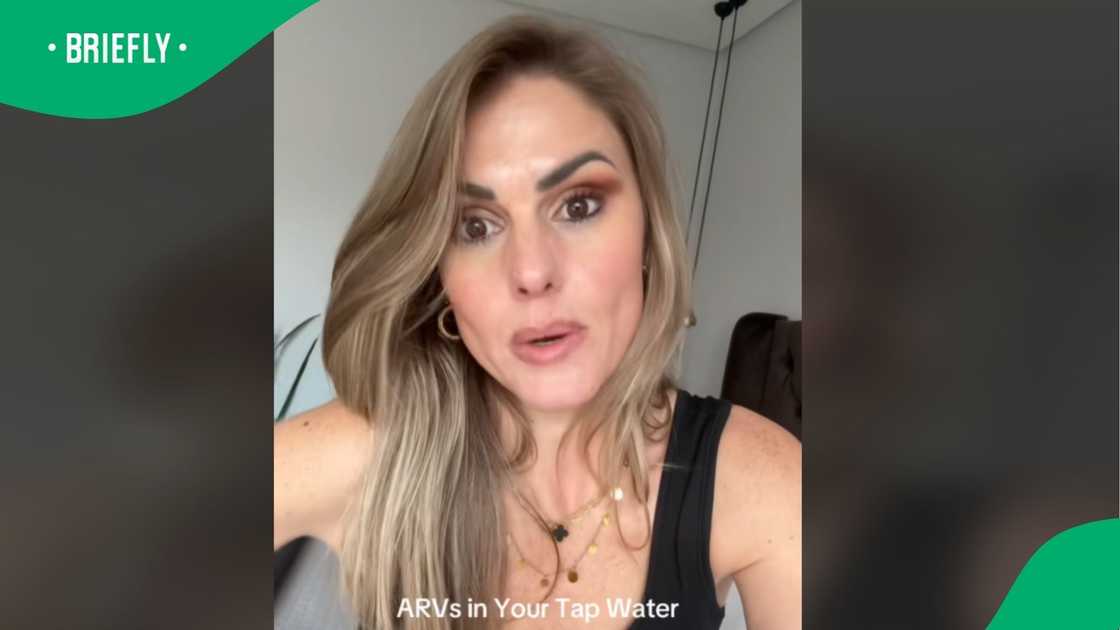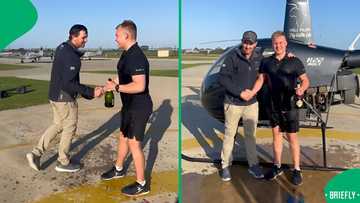“There’s Medicine in Your Water”: Expert Water Sommelier Weighs In on ARVs in Tap Water After Study
- South African water expert Candice Barry broke down the findings of a study that found antiretroviral drugs in tap water supplies
- The water sommelier explained that the levels are safe, but the university study suggests concentrations were "exceedingly high"
- Mzansi reacted with shock and humour to the news, with some joking about suddenly feeling better after drinking tap water
- Briefly News spoke to health expert Jayshri Rangasamy regarding the ARVs that were found and how this can impact human and environmental health

Source: TikTok
A South African water expert has sparked important conversations about water safety after addressing the shocking discovery of antiretroviral drugs in the country's tap water supply.
TikTok content creator Candice Barry, known as @watersomm and recognised as the finest water sommelier, shared her professional opinion on the North West University study that found ARVs in drinking water across the country.
Barry, who runs her water consulting firm and works as a water strategist and storyteller, explained the conflicting reports between the university's findings and the Department of Water and Sanitation's response. The department maintains that ARV levels in tap water are not dangerous to public health, but the university study claimed concentrations were "exceedingly high."
The water sommelier broke down the process of how medications end up in drinking water, explaining that people taking ARV medication excrete traces through urine, which then enter the sewage system. Most water treatment facilities don't have the technology to remove pharmaceutical residues, so these traces end up back in the water supply after treatment.
PAY ATTENTION: Briefly News is now on YouTube! Check out our interviews on Briefly TV Life now!
Barry repeated her long-standing message that if it's clear doesn't mean it's clean, warning that many invisible contaminants exist in tap water. She stressed that regular three-stage water filters won't remove medications from water, and people need specific technology designed to filter out pharmaceutical compounds.
The expert revealed that water treatment facilities currently lack the technology to remove medications because pharmaceutical contamination has never been an issue before. She advised South Africans to invest in proper water filtration systems that can specifically remove medicine from water, rather than assuming any filter will work.
Barry also mentioned that other medications like oestrogen from birth control pills can be found in water supplies, showing the broader issue of pharmaceutical contamination in drinking water systems.

Read also
South African man's pressure cooker mishap leaves Mzansi in stitches as meat drastically disappears
Briefly News spoke to health expert Jayshri Rangasamy regarding the ARVs that were found and how this can impact human and environmental health. She stated:
"Due to widespread HIV treatment in South Africa, trace amounts of antiretroviral drugs (ARVs) have been found in drinking water near wastewater plants. Though concentrations are low, long-term exposure may pose health risks like antimicrobial resistance and metabolic disruption."
"Current wastewater treatment technologies are not designed to remove these bioactive compounds, and their presence has already shown adverse effects on aquatic ecosystems, such as altered development in freshwater snails and disruption of bacteriophages essential for water purification, prompting calls for improved purification and regulation to mitigate long-term risks to both human health and the environment."

Source: TikTok
Mzansi reacts with concern and humour
South Africans flooded the comments with mixed reactions of concern and unexpected humour:
@Zulpha asked:
"How do ARVs end up in our tap water in the first place?"

Read also
Dr Nobuhle Makhaya went from earning R50K a month to being unemployed, highlighting doctors’ challenges
@Sky.Codes joked:
"This is why I've been farting so much."
@userwhatwhat questioned:
"Can ARVs be dangerous to consume?"
@Romano wrote:
"Who still drinks tap water😭"
@Baradi Thornton explained:
"ARVs are passed through urine, they enter sewage systems & most treatment plants aren't built to filter out pharmaceutical residue. That water often flows into rivers, meaning traces of ARVs end up in our natural water sources"
@Ali shared:
"I saw someone say people are walking around wondering why they feel better all of a sudden 😭😭😂"
@Feziekk warned:
"For the ones saying that they feel better after drinking, I have some bad news for you😭😭"
@ntombii_yom_zulu added:
"Makes sense, the amount of weight I gained y'all 😭😭😭"
Watch the TikTok clip below:
3 Other stories about water
- Briefly News recently reported on the North West University study findings, but the full impact of what these ARV traces could mean for public health has left experts divided.
- A young man's pool experience went viral on TikTok, but what happened when he jumped in without swimming skills had viewers holding their breath in terror.
- Passengers jumped out of a moving taxi when something started filling their vehicle, but the cause of the panic had commuters sharing their own transport horror stories.
Updated by Hilary Sekgota, Human Interest HOD at Briefly News.
PAY ATTENTION: Follow Briefly News on Twitter and never miss the hottest topics! Find us at @brieflyza!
Source: Briefly News

Nerissa Naidoo (Human Interest Editor) Nerissa Naidoo is a writer and editor with seven years of experience. Currently, she is a human interest writer at Briefly News and joined the publication in 2024. She began her career contributing to Morning Lazziness and later joined Featherpen.org. As a TUW ghostwriter, she focused on non-fiction, while her editorial roles at National Today and Entail.ai honed her skills in content accuracy and expert-driven editing. You can reach her at nerissa.naidoo@briefly.co.za

Jayshri Rangasamy (Medical Scientist - Pharmacologist - Clinical Team Lead) Jayshri Rangasamy leads Fortrea's Clinical Team, managing Clinical Operations Delivery. Her expertise spans non-infectious (cardiovascular, endocrinology, gastroenterology) and infectious diseases (tuberculosis, Ebola, COVID-19) plus oncology (lung cancer, hematologic malignancies). She holds MS and BS degrees in Pharmacology and Human Physiology from the University of Pretoria and promotes empathetic leadership. She is also a ballroom dancer and animal activist.


